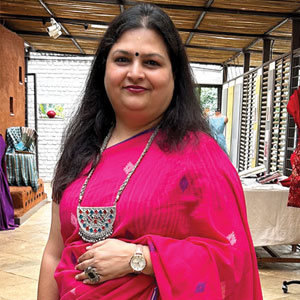
MKSSS'S School Of Fashion Technology: Embedding Eco-Conscious Fashion Practices Into The DNA Of Learning
By Dr Garima Bhalla, Principal
Fashion education worldwide is undergoing a major shift. It is no longer limited to creating stylish garments but now emphasizes sustainability, eco-conscious practices, digital design tools, and industry-ready skills that prepare students to thrive in a competitive global market. With fashion trends evolving rapidly, institutes must equip learners with creativity, innovation, and practical exposure to bridge the gap between the classroom and industry.
Leading this transformation in India with its future-oriented programs is MKSSS’s School of Fashion Technology (SOFT).
SOFT was established 27 years ago under Maharshi Karve Stree Shikshan Samstha (MKSSS), an organization with a long-standing commitment to empowering women through education. At that time, India had very few structured fashion design degrees, and the institute filled this crucial gap by offering one of the earliest professional programs in the field.
Over the years, the institute has steadily expanded its portfolio, introducing specialized courses in fashion communication, textile design, jewellery design, and interdisciplinary fashion. The interdisciplinary model is one of SOFT’s key strengths, as it allows students to major in fashion while selecting minors from other streams, encouraging them to combine creativity with diverse skills.
This flexible approach helps learners design unique career paths, blending different domains such as fashion and jewelry or fashion and textiles. With its focus on innovation, industry relevance, and academic excellence, the institute continues to stand out as a leader in fashion education in India.
Early Steps in Sustainability
Long before sustainability became a global buzzword, SOFT had already embraced it. In 2011, the institute signed an MoU with DyStar India, to start conversations about sustainable practices, leading to the creation of the Green Fashion India Consortium.
Since then, SOFT has hosted international conferences, student competitions, and workshops that bring together designers, researchers, artisans, and academicians from India and abroad.
Students also work on projects that reuse and recycle materials, such as turning fruit waste pulp into patented products. Recently, the institute showcased its eco-friendly practices at Bharat Tex in New Delhi, highlighting its commitment to green fashion.
SOFT not only teaches creativity but also encourages innovation and research. Its incubation cell supports student startups and capsule collections. The faculty and students regularly publish papers and have won awards on international platforms.
The institute has also received recognition for its patents, global design competition and research contributions, proving that it is building a culture of experimentation and problem-solving.
SOFT empowers future designers by merging creativity, sustainability, and technology, shaping leaders who redefine fashion with purpose, vision, and responsibility
Hands-On Skills & Industry Integration
What makes SOFT stand out is its balance of creative design principles and practical skills. Students are trained on both traditional looms, such as Paithani and Khan weaving, and advanced digital tools like Optitex, Rhino, Wonderweaves, and ShimaSaki knitting machines.
They also learn about garment construction, textile innovation, and upcycling through industry-led workshops. A highlight of the program is the graduating collection, where final-year students create professional fashion lines guided by top designers.
Industry integration is a strong pillar of SOFT. It has an exclusive MOU with the Clothing Manufacturers Association of India (CMAI) for internships, placements, and live projects. Speaking more on this, Dr Garima Bhalla, Principal, SOFT says, “Our students are mentored by leading names like Hemant Trivedi, Karishma Shahani Khan, Ken ferns, Nivedita saboo, James ferraira and Hemang Agarwal.
Our advisory board members include industry leaders such as Rahul Mehta, Meher Castelino, Santosh Katariya who ensure the curriculum stays relevant. Our alumni also play an active role by mentoring students, evaluating projects, and offering insights into industry trends”.
Global Exposure
SOFT believes that fashion is global, and students need to experience it first-hand. They participate in events such as Graduate Fashion Week in London, international design competitions held by the Society of Dyers and Colourists (UK) and research based competition at International Foundation of Fashion Technology institutes (IFFTI). Study tours to Paris and Italy expose them to Premier Vision exhibition, Gucci and Salvatore Ferragamo museums, and upcoming global trends.
Tie-ups with international universities like Manchester Metropolitan University, University of Arts Bournemouth, Domus Academy, and NABA (Italy) provide opportunities for students for dual degree pathways, and masterclasses.
Looking ahead, SOFT is constantly evolving to keep pace with change. The institute aims to build a Centre of Excellence in Green Fashion, strengthen its AI-driven digital design labs, and expand global collaborations. It plans to integrate eco-conscious materials, circular design practices, and entrepreneurship into its programs, ensuring graduates are not only skilled designers but also innovators and responsible professionals.
In conclusion, SOFT takes pride in balancing heritage, modernity, and sustainability. By combining traditional crafts with cutting-edge technology, promoting green practices through Green fashion India (GFI), and offering global exposure, it has created a unique space in Indian fashion education.
With its strong foundation, visionary initiatives, and commitment to women’s empowerment, MKSSS’s School of Fashion Technology continues to prepare students for the future of fashion, which is creative, sustainable, and globally competitive.


